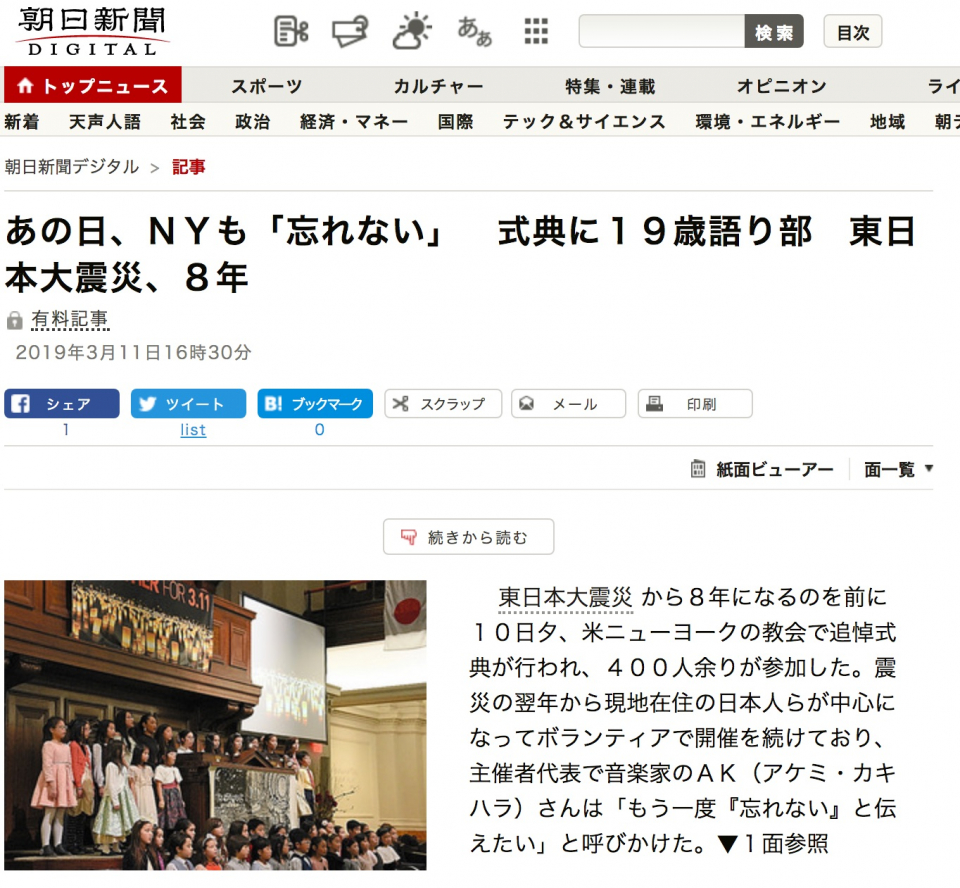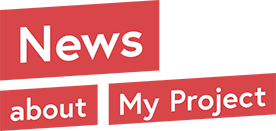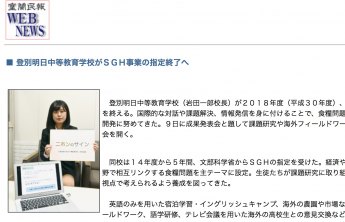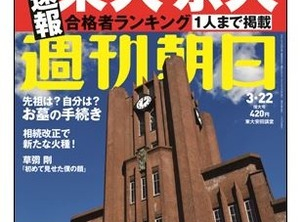【メディア掲載】朝日新聞に掲載〜アワード2017出場者が追悼式典に登壇〜
全国高校生MY PROJECT AWARD 2017全国Summitにて、文部科学大臣賞を受賞したマイプロジェクト卒業生のスピーチに関する記事が、3月11日(月)の朝日新聞に掲載されました。

記事では、3月10日に米ニューヨークの教会で東日本大震災の追悼式典が行われ400名余りが参加する中、当時小学5年生で被災した本人の当時の思いが掲載されています。
▼当日の様子はこちらからご覧ください。
三浦七海フルスピーチとテキスト全文 / Nanami Miura Full Speech and text
ENGLISH text below*****日本語*****ニューヨークで開催された東日本大震災追悼式のゲスト・スピーカー、三浦七海さんのスピーチ全編の記録映像です。被災を理由にいじめにあったことがきっかけで語り部になったという七海さんの衝撃のストーリー、多くのメディアで一部が紹介されましたが、19歳が自分の言葉でニューヨークの聴衆に向けて語った渾身のスピーチをぜひご覧ください。テキスト全文も日本語と英語でお読みいただけます。プロファイル:https://www.facebook.com/TOGETHERFOR311/posts/2165319120195589?sfnsw=cl***************************私の名前は三浦七海です。年齢は19歳です。震災時は11歳でした。今はトロントにワーキングホリデーを利用して滞在しています。 私は15歳の時から、地震と津波そして学生の時にいじめられた経験を「語り部」としてたくさんの方々に伝える活動をしています。これから、私のこれまでのこと、これからどうしていきたいかをお話しします。8年前の東日本大震災では、私の地元宮城県名取市閖上地区にも甚大な被害が及びました。子供がドールハウスを振ったような長く大きな揺れと、地を這いながら車も家も人をも全てを飲み込んだ真っ黒な津波は今でも鮮明に覚えています。 当時学校にいた私と弟、学校に迎えに来てくれた母、内陸部で働いていた父、全員が無事でしたが、海の近くにあった家は全壊流失。学校も陸の孤島と化しました。 次の日の夕方には市内の内陸部の小学校の体育館の避難所へ移り、そこで16日間過ごしました。しかし避難所での生活は生きた心地がしませんでした。 いつも誰かが俯いていて、泣いていて、怒っていて、大人たちみんなは途方にくれていて、生きる気力がない事は理解していました。 体育館の後ろの壁に毎日更新される亡くなった方の名前はさらに私たちを苦しめました。私も誰を探しているわけでもなくただただその紙を見つめて知っている人を探していました。そして見つけると、「あ、またか。」と感じるだけで、人がなくなる悲しみの感覚が麻痺していました。 そして避難所を出て、アパートへ引っ越した時、これまでの生活のありがたみを知りました。温かいご飯が食べられる事、清潔な衣類を着れること、プライバシーが守らた部屋があること、パジャマを着て一人一人寝れること。 何もかもが当たり前だったけれども、当たり前は当たり前ではないことを子供ながら感じました。 その後小学校が再開し、また新たな生活をしていく中で、全国・世界からの支援で生きられたのだなと小学生ながらも身に染みて実感した1年を過ごしました。 中学校は再建先に合わせて転校しましたが、そこで私は3年間、被災を理由にしたイジメを経験することになります。 「支援物資をもらってずるい」「閖上に帰れ」「なんで周りの人は死んだのにお前は生き残っているのだ」と言われ、カバンに砂利を詰められ、嫌なあだ名で生徒からも先生からも呼ばれ、人間に対する信用がだんだんと無くなっていきました。 この時に私は「無闇矢鱈に人を、特に大人を信用してはいけない」「被災地生まれを言う事は恥だ」という事を学びました。 そんな中、15歳の時に知り合いを通じてボランティア団体を運営している高校生とお話をする機会があり、その時に初めて身近ではない誰かに対して、私の過去の話をしました。 その事がきっかけとなって、その翌週には東京から来た同ボランティア団体の学生たちに初めて震災の出来事を人々に伝える「語り部」をしました。それから私は県内外、国内外問わず私の話に耳を傾けてくれる全ての人に約5年間伝え続けています。そして語り部を行っていく中で、かつて間違えて学んでしまっていたことを覆すことができたのです。 私は語り部を始めて、たくさんの出会いが生まれ、今の自分が成り立っています。そしてこの場を借りて、今の話をみなさんに共有できたこと、8年が経とうとしている今でも被災地を思い追悼してくださるみなさんに感謝申し上げます。本当にありがとうございます。 私はこの語り部を生きている限りずっと続けると決めています。 震災から学べる知識は世界中の人とって必要不可欠なものです。もしどこかで災害が起きた時、自分で自分の身を守れるように。震災後はお互いが寄り添い、貶すのではなく励ましあって一歩を踏み出せるように。 私以外にもこれからもずっと多くの語り部たちのお話に耳を傾けてください。そしてどうか震災のことを忘れないでください。みなさんが忘れない限り、今日私が伝えた話はいつかどこかで役に立つ時が来るでしょう。ご静聴ありがとうございました。 *********ENGLISH*********As a Japanese story teller (Kataribe), Nanami Miura gave a powerful and courageous speech at TOGETHER FOR 3.11 memorial event on March 10, 2019. She experienced many bullying being a girl from a disaster area. Eventually, she was determined to be a storyteller to share the important knowledge about the disaster everyone should know… to encourage oneself or others. Many media has told her stories. Please watch her full speech. English script below. Nanami’s profile: https://www.facebook.com/TOGETHERFOR311/posts/2165319120195589?sfnsw=cl***************************<Speech script>Hello everyone. I'm Nanami Miura, and I'm 19 years old. I was 11 when the earthquake and tsunami struck. Currently, I'm staying in Toronto as part of the working holiday program.I've been sharing my story as a kataribe, or storyteller, since I was 15. My story is about my experiences during the disaster, and the bullying that came after. Here is the story of my past and future. Eight years ago, the Great East Japan Earthquake devastated Tohoku, including my hometown, Yuriage, in Miyagi Prefecture. That disaster is still fresh in my mind. The earthquake was so long and intense, it felt like we were in a dollhouse that an angry child was shaking. Then the huge black tsunami swallowed up houses, cars, people, and everything else on the ground. My little brother and I were at school when it happened. My mother rushed there to find us. My father was working inland, so everyone in my family was safe, but all the buildings near the sea were completely destroyed, including our house. The school itself was not damaged, but it had become an island, surrounded by the floodwaters from the sea. The next evening we moved to a temporary evacuation center in an elementary school gym in an inland part of the city. We spent 16 days there. Life there was horrendous.Everywhere people were crying, angry, or just staring at the floor in shock. I knew all these adults were completely lost and had no will to live.There was a list on the wall of everyone who had died in the disaster, and it was updated every day. That list was agonizing for all of us. I just stared at it without looking for anyone in particular. When I saw the name of someone I knew, I was so desensitized to death that I only thought, "Oh, another one.”When we finally moved from the evacuation center to an apartment, I was very grateful for the everyday life that we had taken for granted before the disaster, such as being able to eat hot meals, wear clean clothes, have a room with privacy, and sleep in pajamas without sharing a bed. These were normal things, but even though I was only 11, I knew these "normal" things were not normal.The elementary school eventually re-opened and I started a new life as a 6th grader. During that final year in my elementary school, although I was still very young, I truly felt that we had survived thanks to the support from our country and the rest of the world.Then my family began building a new home in another district outside the disaster area, and I was proactively sent to a new junior high school in that district. All through my three years there, I was bullied for being from the affected area.The other students said things like, "You're so sneaky; why should you get aid while we don't?" "Go back to your home town." "Why are you still alive when everyone around you died?" They stuffed my school bag with gravel. The students and even the teachers called me nasty nicknames. I eventually lost my faith in people. I learned two things: "Don't trust people blindly, especially adults, because they're cruel. And don't tell anyone that you were born in the disaster area.”When I was 15, thanks to an acquaintance, I met a high school student who belonged to a volunteer organization, and I shared my past with that student. It was the first time I had shared my experience with someone I did not know. The next week, several students from the same volunteer organization in Tokyo visited our town. I told them the story of the Great East Japan Earthquake. It was my very first storyteller event.The next week, several students from the same volunteer organization in Tokyo visited our town. I told them the story of the Great East Japan Earthquake. It was my very first storyteller event.In the 5 years since then, I have told my story to anyone who will listen, in Japan or anywhere else. And by doing this, I've been able to change the bitter lessons I learned before: "Don't trust people. Don't tell anyone you were born in the affected area.”I have met many people since I became a storyteller. All these meetings have helped me become what I am today.I want to thank everyone here today for letting me share my story, and for remembering the affected people and the devastated areas 8 years after the disaster. Thank you very much.I am determined to be a storyteller for the rest of my life. The knowledge we gain from disasters is imperative for everyone on earth. This knowledge will help people protect their own lives when disaster strikes. And it will help people stay together, encourage each other, and move forward together, instead of putting each other down.Please listen to the stories of the other storytellers. And please don't forget the disaster. If you remember the disaster, the story I've told you today will be useful someday.Thank you very much for listening.
TOGETHER FOR 311さんの投稿 2019年3月11日月曜日




